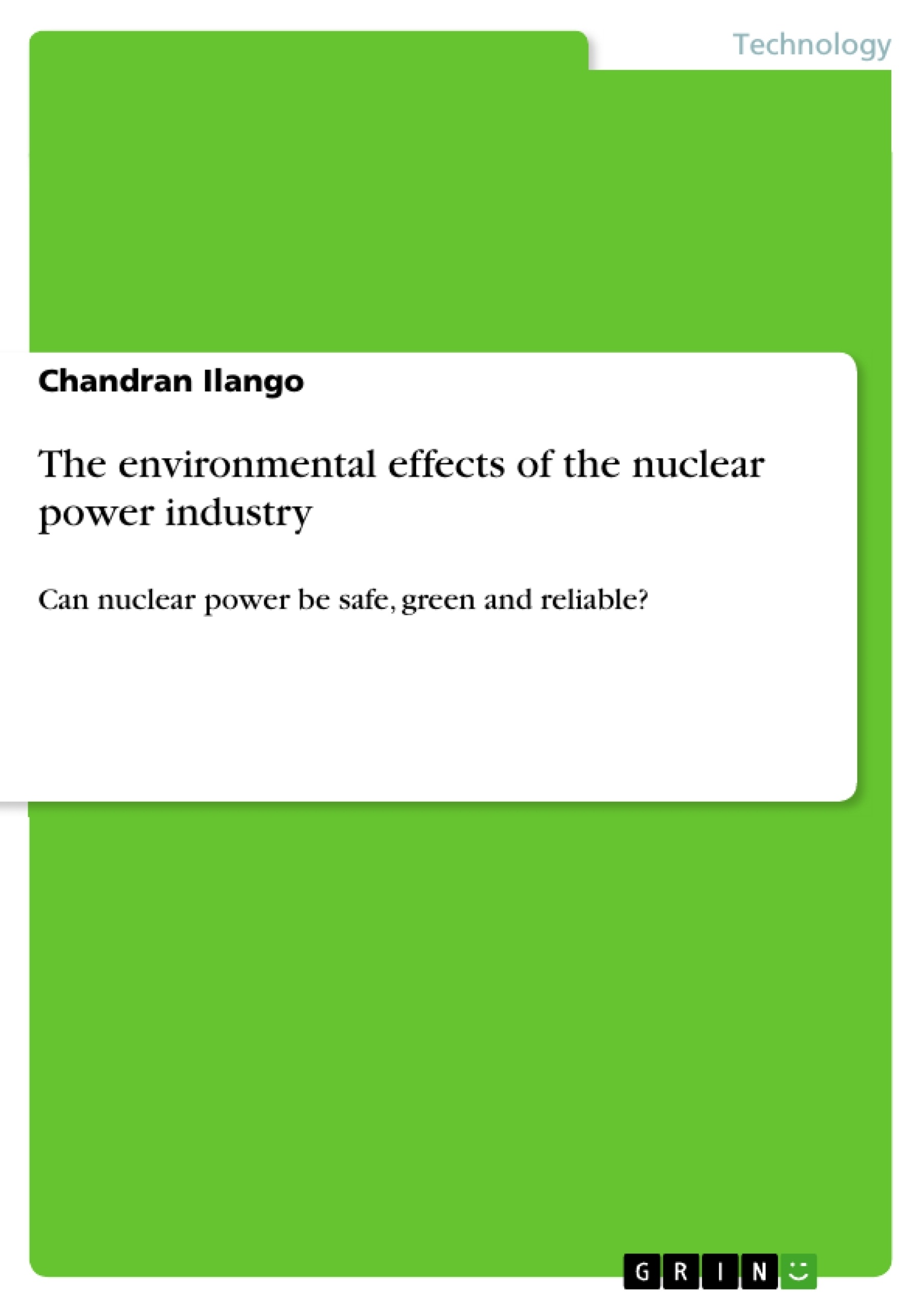I worked on this paper during my Bachelor degree in Environmental Management during 2013 spring. Topics include the global environment, current and future energy issues, sustainability development, and the viability of green initiatives. This thesis study really helped me understanding past, present and potential future energy sources and their impact to environment.
Nuclear power was introduced for commercial energy sector during 1950 to meet the global power demand. Nuclear power is proven environmentally economic, reliable, efficient and greener. However, nuclear waste disposal technique and Fukushima Daiichi and Chernobyl Nuclear power plant accidents created waves of fear and concern to environmentalist. Industrialist and environmentalist started to debate on nuclear power expansion project based on pro and cons of nuclear power. Environmentalist opposed and claiming nuclear power is expensive and dangerous to health, safety and environment.
Further, they suggest and recommend that alternative energy such as wind, solar and thermal industry to be focused and invested for sustainable future. However, industrialist argued that we have improved modern technology to manage the nuclear waste to keep away from health, safety and environmental hazards. They also highlighted that the nuclear industry is highly regulated by Government to monitor and keep the hazard within permissible limits. Fossil resource is extensively used for energy sector which create unsustainability and push United States to depend on foreign oil resources.
I have analyzed and summarized various authors and environmentalist articles argument on this subject. I have also explained the benefits of nuclear energy along with the risk involved in health, safety and environment. In conclusion, I have summarized my understanding and view recommending nuclear power energy over the other energy industries.
Table of Contents
- Can Nuclear Power Be Safe, Green and Reliable
- Introduction
- Review of Literature
- Nuclear Power Benefits
- Nuclear Power Risks
- Nuclear Waste Management
- Conclusion
Objectives and Key Themes
The objective of this work is to explore the debate surrounding nuclear power as a viable and sustainable energy source. It aims to analyze arguments from both proponents and opponents of nuclear power, examining its potential benefits and risks. The paper investigates key themes and arguments presented by various authors and environmentalists to provide a comprehensive overview of the nuclear power debate.
- Environmental and health impacts of nuclear power
- Economic viability of nuclear power compared to alternative energy sources
- Safety and reliability of nuclear power plants
- The role of nuclear waste management in the nuclear power debate
- The potential for nuclear technology to be used for weapons proliferation
Chapter Summaries
- Introduction: This chapter introduces the historical context of nuclear power development, highlighting its intended use for military purposes and subsequent transition to civilian energy production. It also discusses the early perception of nuclear power as an economical, reliable, and environmentally friendly alternative to fossil fuels, while acknowledging the emerging concerns related to safe operation, waste management, and health hazards.
- Review of Literature: This chapter delves into the arguments of various authors and environmentalists on the pros and cons of nuclear power energy. It examines different perspectives on the safety, cost-effectiveness, and environmental implications of nuclear power, drawing on various sources to present a balanced discussion of the debate.
- Nuclear Power Benefits: This chapter focuses on the advantages of nuclear power, highlighting its potential to reduce greenhouse gas emissions, promote clean air, and conserve water resources. It explores the economic benefits of nuclear power, including lower electricity costs and the creation of new jobs. The chapter also discusses the reliability of nuclear power plants, emphasizing their ability to generate power independently of weather conditions.
- Nuclear Power Risks: This chapter addresses the potential risks associated with nuclear power, examining concerns related to radioactive waste disposal, the potential for accidents, and the health and environmental impacts of radiation exposure. It explores arguments from both proponents and opponents of nuclear power regarding the safety and security of nuclear technology.
Keywords
This work focuses on the debate surrounding nuclear power, examining its potential benefits and risks. Key themes include environmental sustainability, economic viability, safety and security, radioactive waste management, and the potential for weapons proliferation. The paper analyzes various perspectives on nuclear power, including arguments from proponents and opponents, drawing on diverse sources like scientific research, environmentalist publications, and government reports.
- Quote paper
- Chandran Ilango (Author), 2013, The environmental effects of the nuclear power industry, Munich, GRIN Verlag, https://www.grin.com/document/382487




